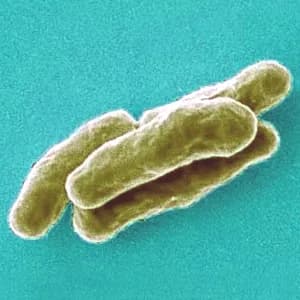
First Snapshot Of Inuit Gut Microbiome Shows Similarities To Western Microbiome
Researchers at the University of Montreal, in Canada, have characterized the gut microbiome of the Canadian Arctic Inuit for the first time. Reporting this week in mSphere, an open-access journal of the American Society for Microbiology, the researchers found that the Inuit harbor a composition and diversity of gut microbes remarkably similar to their urbanized, westernized counterparts in urban Montreal. What differences they did find were subtle, and in the relative abundances of individual taxa.
The strong similarities between the Inuit and western microbiomes surprised Jesse Shapiro, a computational evolutionary biologist at the University of Montreal, who led the analysis. His team hypothesized that they'd find greater microbial diversity in the Inuit study population.
"We expected to see a big difference based on what has been seen in other isolated traditional populations who eat a traditional diet," he said.
Scientific interest in the gut microbiomes of remote populations has surged in recent years. Biologists study these often-isolated, hunter-gatherer communities to better understand the dynamic relationship between diet and the microorganisms that inhabit intestines. Previous studies on rural populations in Burkina Faso, Tanzania, and Venezuela, for example, have reported finding more diversity and different microbes in the study populations than what's found in Western intestines.
The findings on the Inuit from Shapiro and his collaborators strongly diverge from that trend. What a person eats helps determine the microbial population that inhabits their gut. The hunter-gatherer communities in South America and Africa at the focus of previous studies eat traditional diets that are high in fiber. The Inuit, on the other hand, don't. The Inuit who participated in the study live in the Hamlet of Resolute Bay, a remote Arctic village with only about 300 inhabitants. Their traditional diet includes raw game (such as caribou, seal, whale and fish) and few plant-derived foods. It's low in carbohydrates, rich in animal fats and proteins, and a rich source of vitamins and minerals.
It's also changing: Shapiro notes that the Inuit diet is transitioning to become more Western, including more packaged and processed food.
The researchers used 16s rRNA sequencing to characterize the microbial population in stool samples donated by 19 inhabitants of the Hamlet of Resolute Bay, a Canadian Arctic village on the southern end of Cornwallis Island accessible only by plane (and, when the sea ice breaks up, by boat). Shapiro and his team compared the Inuit gut microbiomes to those in samples from 26 adults in Montreal.
The two groups showed strong similarities in composition and diversity. At the same time, further analyses did reveal some subtle differences at the level of individual taxa. The taxa Prevotella, for example, was found with greater relative abundance -- and with greater genetic diversity -- in the Montrealers and the Inuit who ate a Western diet than in Inuit who adhered to a traditional diet. Previous studies have associated Prevotella with fiber-rich diets, and the Western diet includes more fiber than the traditional Inuit diet.
"Our study points to dietary fiber as a major factor driving the overall composition of the microbiome," says Shapiro.
Shapiro and his colleagues say a number of factors might contribute to the similarity between the Inuit and Western microbiomes. For example, as the Inuit diet becomes more westernized, the population faces a rising prevalence of obesity -- which has been linked to less microbial diversity. The effect might also have to do with seasonality. The Inuit diet changes through the year, and the samples were collected in the late summer, when the Inuit eat a mix of traditional foods and those purchased from a supermarket. Shapiro says that collecting samples during other times of the year, when the traditional diet dominates, might yield different results.
He sees the study as the first step -- but definitely not the last -- toward understanding how the Inuit microbiome and relates to their diet. "Other communities could be quite different," Shapiro says. "This is a snapshot at one point in time, of one community, at one time point."
Materials provided by American Society for Microbiology. Original written by Joanna Urban. Note: Content may be edited for style and length.
Disclaimer: DoveMed is not responsible for the accuracy of the adapted version of news releases posted to DoveMed by contributing universities and institutions.
Primary Resource:
Girard, C., Tromas, N., Amyot, M., & Shapiro, B. J. (2017). Gut Microbiome of the Canadian Arctic Inuit. mSphere, 2(1), e00297-16. DOI: 10.1128/mSphere.00297-16
Related Articles
Test Your Knowledge
Asked by users
Related Centers
Related Specialties
Related Physicians
Related Procedures
Related Resources
Join DoveHubs
and connect with fellow professionals

0 Comments
Please log in to post a comment.